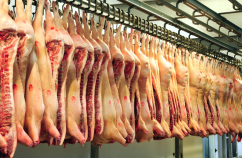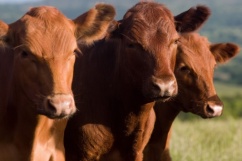Poultry News
The 2 Sisters Food Group has called allegations printed in The Guardian about campylobacter failings “untrue, misleading and inaccurate”.
Felicity Lawrence’s ‘Poultry Industry’s dirty secret’, published in The Guardian yesterday (24 July), claimed that undercover footage, photographic evidence and information from a whistleblower showed 2 Sisters and Faccenda breaking biosecurity rules that were in place to prevent campylobacter contamination.

The article said the companies, which supply poultry meat to Tesco, Sainsbury’s, Asda and Marks & Spencer, among others, regularly flouted hygiene standards. It reported incidents of poor practice, such as factory floors flooded with chicken guts and carcases coming into contact with workers’ boots before being returned to the production line.
However, a 2 Sisters response read: “The allegations about our processing sites at Scunthorpe and Llangefni made in the above article concerning our business and our management of campylobacter are untrue, misleading and inaccurate. There is no campylobacter contamination or problems at our sites, as confirmed by multiple independent external audits and our own rigorous testing.
“We strongly deny and defend ourselves against these allegations. Our company’s heritage is steeped in the poultry sector. We are extremely proud of this heritage and our excellent track record as a poultry processor, and we will remain so. We are doing more than any other business in addressing the key issues our sector is facing and we are leading the way in establishing and enforcing industry best practice.
”The Guardian piece reported that a number of major retailers had now launched emergency investigations into their chicken suppliers. A spokesperson from the British Retail Consortium said: “Food safety is a key priority for retailers and the allegations of poor practice are concerning. These are currently being investigated by the specific retailers involved. All major retailers continue to work collaboratively with their suppliers and government to find solutions to reduce the prevalence of campylobacter.”
Faccenda has also denied the accusations and said it worked hard to improve food safety: “At Faccenda Foods, we recognise the food safety challenge posed by campylobacter and the concerns of consumers in this area. Through our Campylobacter Action Plan, Faccenda Foods continues to invest significantly across the whole supply chain to address this top priority issue. Our investment in current projects to tackle campylobacter is in excess of £1m.”

A young Devon farmer is preparing to embark on a 39-day tour of Europe to campaign for clearer poultry labelling – and is doing it dressed as a chicken.
Tamsin French will be costumed as a chicken called ‘Rosa’ and will travel through 21 EU member states in 39 days, which is apparently the average lifespan of an intensively farmed meat chicken. Rosa the chicken is calling for clear and mandatory labelling so that consumers can see how their chicken has been kept. The 39Days4Rosa tour is taking place as the European Commission reviews poultry meat labelling this summer.
French’s family farms a 22,000 strong, Freedom Food-assured broiler flock in Devon. She said: “Our free-range chickens live for 56 days, and from the moment they’re old enough to go outside, they can range through tree-covered, landscaped fields where they can express natural habitual behaviour. It’s important that consumers can accurately and easily identify the farm system used to rear their chicken meat. The labelling term ‘free range’ accurately reflects the life of our free-range chickens.”
She will be joined on the trip by Johanna Olsson, an Animal Science student from Berkshire, and Sam White, an animal welfare campaigner from Essex.
UK meat leaders have expressed disappointment over the reporting of a US-based study which claimed that beef production was 10 times more damaging to the environment than other livestock.
The study, published in the Proceedings of the National Academy of Sciences (PNAS), claimed that by applying a uniform methodology to data from the US Departments of Agriculture, the Interior and Energy, it showed that beef was far ahead of other proteins when it came to environmental impact.
A summary of the study said: “The authors found that impacts of dairy, poultry, pork, and eggs were mutually comparable within a factor of two. Beef, however, required 28 times more land, 11 times more irrigation water, five times more greenhouse gas emissions, and six times more reactive nitrogen fertiliser than the respective average burdens of the other four livestock categories.

”Plant-based production, however, including potato, wheat and rice, on average needed “two to six times fewer resources per calorie consumed than non-beef livestock”, it added.
The news has been widely reported across mainstream media, but UK meat bosses have hit back at the coverage, which they said failed to recognise that US production differed considerably from UK grass-fed production.
Nick Allen, sector director for red meat levy body Eblex, said: “Our rain-fed pasture system means we have one of the most efficient and sustainable livestock production systems in the world. In the UK, cattle and sheep primarily convert grass, which cannot be used to feed people, into nutritious food for our growing population. We have very little reliance on irrigation; in fact it takes just 67 litres of water to produce 1kg of beef.
“There are also additional environmental benefits of grazing ruminants, not least in terms of landscape management and maintaining biodiversity, yet livestock production still comes in for undue criticism.
”One of the authors of the report Professor Gidon Eshel, speaking to The Guardian newspaper, acknowledged that US grain-fed production systems exacerbated the issues surrounding feed inefficiency, but he said that even grass-fed cattle had greater environmental footprints than other animal products.
He said the aim of the study was to change the consumer mind-set: “While my work in recent years has clearly demonstrated that plant-based diets exact lower environmental costs than animal-based ones, in the new paper we recognise that this and related work by others have changed little in US diets; people still eat animal-based products with an ever-increasing gusto.
“Our study has a number of implications. First, it can help environmentally minded individuals make environmentally better dietary choices. Perhaps more importantly, the paper can also help inform US agricultural policy.”
Beef, lamb and pig meat production has increased on last year, according to the latest slaughter figures from Defra.

The figures compare June 2013 with June 2014 and show clean sheep slaughterings – which refers to animals that have been bread purely for slaughter – at 907,000 head for the month, just over 8% higher than in June 2013, while mutton and lamb production was at 21,000 tonnes, 5% higher than in June 2013.
Clean pig slaughterings were 3.7% higher than last June at 772,000 head and pigmeat production was 6% higher at 64,000 tonnes.
Although prime cattle slaughterings were down 0.5% and 150,000 head this year, beef and veal production was almost 3% higher than June 2013 due to continuing heavy carcass weights, according to Defra.
Stephen Rossides, director of the British Meat Processors’ Association, commented on the cattle figures: “Overall [there was] lower beef production in June. But I think for a fuller picture of the market, a longer time frame needs to be taken, as well as trends in imports, exports, retail demand and weather factors.”
Defra said the report is subject to revision in August when they will publish the updated figures.
Another meat body has expressed its concern at the fall in lamb prices as supply increases.
After Quality Meat Scotland (QMS) reported a cooling of lamb prices, Hybu Cig Cymru – Meat Promotion Wales (HCC) has joined the discussion, confirming that a greater number of lambs have come into market earlier than usual. Like QMS, HCC has also cited the strong pound against the euro as a contributor to the problem.

The UK beef industry has already been suffering from a farmgate price crisis, and summits have been held to find solutions.
John Richards, HCC’s industry information executive, said: “This year, thanks to a good lambing season and mild weather, there is a significant increase in the number of lambs now reaching the market. It must also be borne in mind that lambs are entering the market earlier this year, extending the season. It means that the traditional seasonal trend has occurred a few weeks earlier in comparison to other years.”
HCC said the falling lamb price highlights the importance of diversifying exports. Richards added: “This reinforces HCC’s strategy of looking for other markets around the world, so that we are not entirely dependent on one currency for our export trade. We are already exporting Welsh Lamb to the Middle and Far East, as well as Scandinavia and Canada, while working to gain entry into new markets including China and the USA.”
Thursday night’s SuperMeat & Fish Awards celebrated the best British supermarkets have to offer, with Tesco winning overall retailer of the year.

Tesco took home the title of Meat and Fish Retailer of the Year as well as the Head office Initiative Award.
Head judge Fred A’Court, who was impressed with the Tesco stores, said: “A high level of consistent quality in its product range, allied to attention to detail and good availability throughout its stores helped Tesco to a good win in this year’s awards. It is now making progress in creating warmer, friendlier and distinctive shopping zones in some of its stores that make customers feel comfortable and relaxed while they shop.”
Attending the prestigious event in central London Mark Green, who collected the overall retailer award for Tesco told Meatinfo.co.uk: “This is the award we wanted and why we entered.“ Tesco are committed to develop and train staff and our fresh food capability sets us apart. From a head office perspective we are committed to train our staff, over the course of the year we have trained 3,000 colleagues on how to skin our meat and fish, right through to the finished product. We are really proud of the products we sell and the service that we offer our customers.“ When you look at the competition whether it be Aldi, Lidl or Morrison’s, everybody has done a great job and it is extremely competitive, so we are extremely proud to come out on top.” Ed Bedington, editor of Meat Trades Journal which organised the awards, said: “Many congratulations to Tesco – a most deserved win. The results, which saw Tesco perform consistently well throughout, show the amount of work the retailer has been doing to improve its quality.”
A total of 13 product awards and seven regional store awards were given out at the glitzy event presented by musician and television personality Myleene Klass.

Best Overall Product was awarded to Marks & Spencer for its Steak and Old Peculier Ale Pie. Morrisons Camden scooped two awards for Best Store Team and Best Meat Counter, while Tesco Superstore, Launceston, Cornwall was awarded Best Fish Counter. The most innovative product was given to Tesco for its Beef Lollipops with a Cherry BBQ Sauce.
This year’s ceremony also played host to the Tri-Nations Butchery Awards, held earlier in the day at the Great Yorkshire Show. This saw top butchers from Great Britain, Australia and New Zealand go head-to-head for the title. The Kiwis were crowned champions for the second consecutive year.
Bedington added: “This competition is a great showcase for the supermarket sector, and this year was no different, with a superb range of entries and a close-fought battle for every category. We look forward to seeing how Tesco defend their title next year, as I know the other retailers will be itching to get their hands on the crown.”
In the wake of the UK’s beef pricing crisis, Waitrose has raised its “price floor” for British beef.

The supermarket set a minimum price it would pay British farmers for their beef at £3.40 per kilo until September 2014. However, this has now been raised to £3.45 per kilo until 1 October 2014. In addition to this price rise, Waitrose will also raise the price paid for standard British cattle, used for the Essential Waitrose range, by 0.02p per kilo. “Because British beef is such a key part of our business and we are certain that a further erosion of prices will not serve well processors or producers, we decided, in early May, along with our own dedicated processor Dovecote Park, to set a price floor for beef,” a spokeswoman for the supermarket told Meatinfo.
Meatinfo has reported extensively on the beef pricing crisis affecting British farmers, who have seen the farmgate price for beef cattle drop significantly. Farmers argue this has been caused by cheaper imports flooding the market, especially from Ireland, coupled by a lack of commitment from supermarkets to support British farmers.
This step from Waitrose has been welcomed by the National Farmers’ Union (NFU), which is urging other supermarkets to follow suit. Pete Garbutt, chief livestock advisor at the NFU, told Meatinfo: “This is good news and an example of a supermarket standing by its suppliers and looking to the long term.
“When Waitrose announced its threshold price last month the NFU came out and praised it publicly. This is a great example of supermarkets working for the long term and would love other supermarkets to take a similar view.”